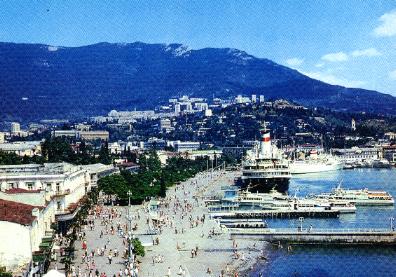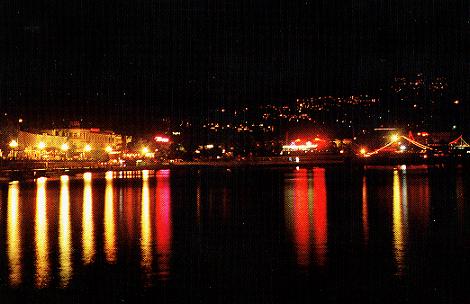|
YALTA

City, located 79 km south of Simferopol. Population: approximately 150,000.
In the 12th c. the Arabic geographer Idrizi mentions Dzhalita, i.e. Yalta, as the city of the Polovtsians. At first the southern shore of the Crimea was part of the kingdom of Feodoro. Later it came under the control of the Genoese. On Italian maps of the 14th c. it is called Healita, or Etalita. In the 15th c. the city was levelled by an earthquake. The Greeks and Armenians settled the district only 70 years later. Since then the settlement has been known as Yalta.
Together with neighbouring villages and cities, Yalta is the largest international re-sort in the Crimea. It began to develop as a resort in the 19th c. Today there are 144 therapeutic resort establishments. The main one is the I. Syechenov Yalta Scien-tific-Research Institute of Physical Thera-peutic Methods and Medical Climatology.
The young Mark Twain spent time in Yalta. The poet, S. Rudansky (1834-1873), lived here. A memorial plaque has been hung on the building where he lived and died. The renown-ed Ukrainian poetess, Lesya Ukrayinka, came here for a cure. A. Horska (1929-1970), a Ukrainian painter who died under tragic circumstances, was born in Yalta.

 Back to the Crimea Photo Gallery Back to the Crimea Photo Gallery





|
A Foreign Affair
7320 N Dreamy Draw Drive
Phoenix, Arizona 85020
(602) 553-8178
FAX (602) 468-1119
Contact Us
|
|
THIS PROGRAM IS THE SOLE PROPERTY OF A FOREIGN AFFAIR AND MAY NOT BE COPIED IN ANY WAY OR FORM WITHOUT EXPRESS PERMISSION FROM A FOREIGN AFFAIR.
© COPYRIGHT 1996-2025 - ALL RIGHTS RESERVED.
|
|
|









